My Story
Real Stories from People living with Autism Spectrum Disorder
On this Page
Mary Elizabeth’s Story
“Our personal journey into this world of autism began just over eight years ago with the birth of our son, Perry. Since the beginning, he struggled immensely. The first thing we noticed was that he seemed very restless. He was always unsettled. He had a lack of recognition in his eye. He didn’t eat. He didn’t sleep. As each day passed, we recognized more ‘red flag’ characteristics of autism with repetitive behaviors, speech/sound delays and more.
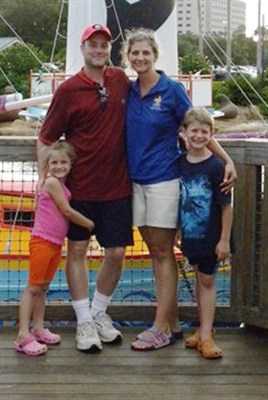
“I put Perry’s name on the waiting list of every developmental pediatrician in and around Atlanta. I was told there would be a minimum 6 month wait time. Meanwhile, at 12 months of age, he was found to be eligible for the Babies Can’t Wait program (Georgia’s early intervention system) due to his developmental delays and he began a steady course of daily therapies. When Perry was 15 months old, we finally got an appointment with a Developmental Pediatrician. The doctor confirmed what I already knew: Perry has autism.
“I cried all the way home. I cried for 2 days, hoping and praying that I would be able to provide this child everything he needed. My research recommended 40 hours of ABA (applied behavior analysis) therapy, which insurance would not cover. I also found thousands of pages of different treatment approaches, all of which claimed to be effective in treating autism. I could not afford to make the wrong choice. My son’s future depended on it.
“In addition, I was 7 months pregnant with our daughter. Margeaux was born blue and immediately faced feeding and sleeping problems of her own. Margeaux’s health struggles continued, one after the other. She was also restless, but in a different way than Perry had been. When Margeaux was 12 months old, we found ourselves undergoing our second Babies Can’t Wait (Georgia’s early intervention system) evaluation. Margeaux’s therapy began and Perry’s therapy continued. Now there were two therapy schedules to juggle. Her ‘official’ Asperger’s diagnosis came at age 5. It was a long road.
“While typical children are scheduling play dates and extracurricular activities, our children’s lives are about therapies, day after day, year after year, usually 7 days a week. People on the outside cannot grasp the necessary skills that our children require help with.
“My incredibly special children have been a true gift. Of course, like any mother, I would take away their struggles if I could. I strive every day to be the kind of parent they deserve. I hope I am as much a gift to them as they are to me. They are a bright spark in so many lives.
My ultimate hope is that one day soon my children will live in a world where they will be accepted and appreciated, despite their differences. As long as I am here, I try to surround them with people who love and accept them as they navigate this world, because autism never takes a day off.”
CDC would like to thank Mary Elizabeth and her family for sharing her personal story.
Carrie’s Story
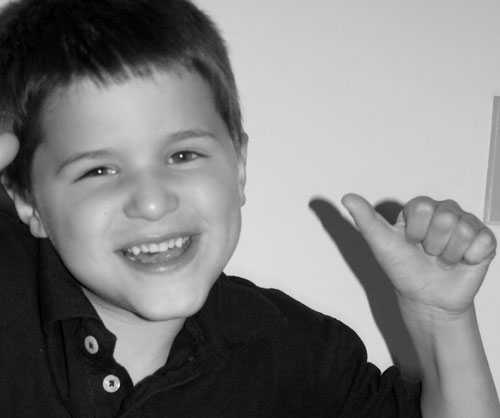
Jack, the author’s son
Let’s play a game, okay? I’ll give you a bunch of clues, and you try to guess who I am.
I am not a person, place, or thing. You can’t see me or touch me or smell me.
I am considered a human condition, but really I am a collection of symptoms.
He doesn’t play with other kids.
She doesn’t like it if we drive home a different way.
He’ll sit and take the vacuum apart for hours.
She doesn’t look at me.
I am the twitching finger and the flapping hand.
I am the silent toddler with downcast eyes and a tippy-toe walk.
I am a diagnosis, a disorder; a box you check on the medical form or a postscript at the end of an email.
P.S. I’m not sure if you’ve heard, but Jack’s been diagnosed.
I will make you have bad days and good days and bad days then good.
I live in each and every one of you, whether you know it or not.
I am the cocktail party that makes you shy and the tag on your shirt that makes you itch. I am the sticky crunch of strawberry seeds and the overwhelming hum of the air conditioner.
I make some people jump and flap, while others chew gum or run for miles or twirl their hair.
I am the Baby Einstein DVD on repeat.
I am long, neat rows of Thomas the Tank engines snaking around your family room. Seeing these rows will make you feel frantic; frustrated and nervous and empty.
I am hours of Minecraft.
Some days, I taste like shame and bitterness, burning up from a mother’s heart like sour indigestion.
But other days, I taste like the purest joy; like cotton candy and happiness and pride exploding within your heart.
He did it. He said Mama!
You can find me in churches and synagogues and mosques.
I am in schools and movie theaters, playground and libraries.
For some reason, people celebrate me in April. They use the color blue. But I am actually all the colors of the world; red for Saturday and yellow for the too-bright sun.
But I am also color blind.
I am in India. I am in Jamaica. I am in the Philippines and Wisconsin and Sierra Leone. You can find me in Russia and Japan, San Francisco and Belgium.
Maybe you sit across from me at your dinner table every night, or maybe you look up to see my reflection in the mirror when you brush your teeth before bed.
I live within a 10-year old boy in New Hampshire. His name is Jack.
One year, I made him afraid of wind. So afraid, in fact, that he would not go outside all winter.
The next year, it was dogs. Because of me, he wouldn’t cross the street if someone was walking their Pug or their Golden Retriever.
And this boy Jack, well, I make him work hard for the things that come naturally for others; language and jokes and facial expressions. He spends a lot of his day anxious and confused. I am his enigma wrapped up in Waffle Thursday and Pancake Saturday.
Mom it is Thursday Thursday for waffles for waffles waffles waffles.
I have been around since the beginning of time, despite the façade of normal assembled by generations before you.
There is no normal. I am here to tell you this.
It is up to you how you see me; as a nuisance, a tantrum, a disorder, or a curious lamb wearing the costume of a wolf. Can you look past my long, yellow teeth and matted hair, and find the soft, gentle child underneath?
Because of me, Mozart wrote long, complicated symphonies. His hearing was rumored to be so sensitive, he could tell the difference in the slightest tone.
Historians explain the way Michelangelo made sketch after sketch until the final pose was perfect in his rigid, unbending mind. Because of me, the Sistine Chapel explodes with light and color. Records show that Albert Einstein did terribly in school. He didn’t learn the same way as all the other kids.
And Sir Isaac Newton of the fallen apple had no friends. He didn’t understand people, and he insisted on a strict, unwavering routine.
And there is Temple Grandin; a woman so intelligent, so compassionate, that she revolutionized the cattle industry through sheer perseverance and determination.
You see, a still mind can still have great thoughts, and within even the quietest person, there is a voice. Or a painting, or a song.
I am so many things. I am hope and possibility. I am music and dreams, kindness and color. I am gravity.
So please, before you panic or judge—before you race for a cure or rush to call me weird—try to remember my value. Remember my goodness.
I will teach you the real meaning of unconditional love; a love so powerful and strong it will rearrange your heart.
At first, you probably won’t even realize that you are learning from me. I am so subtle, I am practically invisible.
But every hour, every day, every year, you and I will make our peace. You will step carefully over the long rows of trains, and admire the complicated cities in Minecraft.
Every Thursday at dawn you will turn on all the lights in the kitchen, and take out the waffle iron for a boy who at last said Mama.
You will forget normal.
I am autism. And I will make you better. I will make your family better.
If you let me, I will make the world better.
Carrie Cariello is a mother and author of the book “What Color is Monday? How Autism Changed One Family for the Better”. CDC would like to thank Carrie for sharing her personal story. An extended version of this story was originally posted on her blog on March 9, 2015.
Alexis’s Story
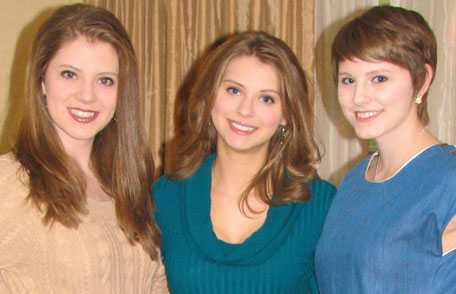
Alexis Wineman is the first woman with autism spectrum disorder (ASD) to participate in the Miss America competition. Alexis was in middle school when officially diagnosed with PDD-NOS (Pervasive Developmental Disorder- Not Otherwise Specified), but felt “different” from an early age. As she got older, she struggled with some of the challenges that come with having ASD, such as a speech impediment, communication difficulties, and being sensitive to loud sounds, and other sensory-related issues. Alexis also had to deal with bullying that occurred because of her differences. Fortunately, her family has always been a source of strength and inspiration for her. We interviewed Alexis, her mother Kimberley, her older brother Nicholas, and her older sister Danielle, and her twin Amanda to hear more about the unique role that siblings play in families living with ASD.
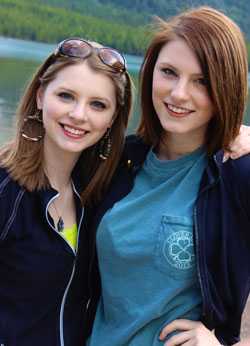
“My advice for other individuals with autism would be to have patience for your siblings just like they have patience for you.”
Alexis’ Perspective
Prior to being diagnosed with autism, neither I nor my family had an explanation for my meltdowns and other issues. After the diagnosis, it was incredible how my siblings reacted. They were superheroes. They took me everywhere and pushed me into activities. They helped me with homework. It was just amazing how they sprang into action after years of not knowing what was going on.
My advice for other individuals with autism would be to have patience for your siblings just like they have patience for you. It’s good to try and figure out what’s going on from their perspective rather than focusing on yourself.
Kimberley’s Perspective
Once Alexis was diagnosed and we knew what we are dealing with, her siblings took control. They shoved her into things and got her involved. They wouldn’t let her use autism as a crutch or excuse for not being involved. Her brother got her into cross-country and her sisters got her into cheerleading. All three siblings got her into speech and drama. Had she not been involved in those activities, she wouldn’t have been able to accomplish all that she has accomplished. Alexis was able to find activities where she was accepted, and she wouldn’t have found those on her own.
Her siblings also became very protective and helped with the teasing and bullying. Siblings can be such a positive force for combatting bullying. They can educate the peer group. That’s something a sibling can be much more effective at than a parent.
My advice for someone who has a sibling with autism would be to engage them and help them find their niche.
Nicholas’ Perspective
Before Alexis was diagnosed, we just didn’t understand why she was acting out. It was very confusing and frustrating. After the diagnosis, things made a lot more sense. Being able to help and take preventive measures, it was a whole new world. It has made us all better people. We learned patience.
It was a common occurrence that we would get into fights, but being able to make up and process what happened was different for Alexis compared to the rest of us. With Alexis, when the fight was over, the board was erased clean. In other words, five minutes later everything was completely back to normal. It seemed like she was doing it to annoy you, but she wasn’t. Not understanding why it was so easy for her to get over a fight was hard. Going through experiences like this makes you have to be more understanding. You learn that people handle things differently.
My advice for someone who has a sibling with autism would be to practice empathy. I consider myself to be empathetic and living with Alexis was a huge part of that.
Danielle’s Perspective
My brother and I had to do some growing up fast. You have to take on a parenting role when you’re trying to understand what’s going on. From the time she was diagnosed, it opened our eyes to understanding people with disabilities. We have openness to people with differences and are able to maintain that empathy. We’ve grown up having to deal with all levels of ups and downs.
I played a second mom when Alexis was younger. If she didn’t listen to mom, I’d go in and say the same thing. Sometimes it’s easier to have someone on her level explain things or give her the opportunity to vent.
My advice for someone who has a sibling with autism is that you have to become a solid shadow for your sibling. They might not fully understand how much you are putting in to be there for them. At the end of the day, each success, no matter how small, is part of you. You deserve to celebrate too. When you’re diagnosed with autism, it’s a diagnosis for the entire family and not just that person. It’s really a test of family.
Amanda’s Perspective
Having a twin is how we figured out there was a problem. There was a direct comparison to a neuro-typical child, and they could see that Alexis wasn’t meeting milestones the way I was. When I was little, whenever I came home from school, I tried to teach her to do things that I had learned so that she could keep up with me.
We are now roommates in college. But I still have to wake her up and help keep her on a schedule. It’s been interesting to see how people in college react to our interactions. They don’t understand that I’m acting in a couple of different roles—sometimes as a sibling and sometimes more as a mother.
My advice for someone with a sibling with autism is to be patient. As stressful as the role you have to play is, it’s also rewarding. If you try to be patient, you get to share in success. Alexis’ America’s Choice Award during the Miss America competition ranks as one of the highlights of my life because I got to share in that success. Never give up on trying to help.
If you would like to share your personal story, please contact us at cdcinfo@cdc.gov
E-mail Your Friends
"Children with autism spectrum disorder are not being diagnosed as early as they could be. Learn the signs of autism and get help if you’re concerned."
Share on Facebook
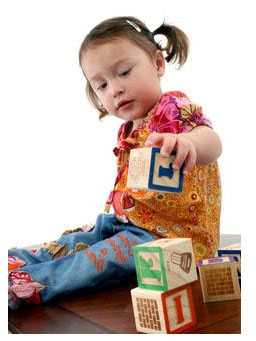
“Many children with autism spectrum disorder (ASD) are not being identified as early as they could be. Early identification is the most powerful tool we have right now to make a difference in the lives of children with ASD.”
Share on Twitter
“Too many children w/ autism are not being identified as early as they could be. Earlier is better. #ActEarly”
- Page last reviewed: March 10, 2017
- Page last updated: December 29, 2015
- Content source:


 ShareCompartir
ShareCompartir